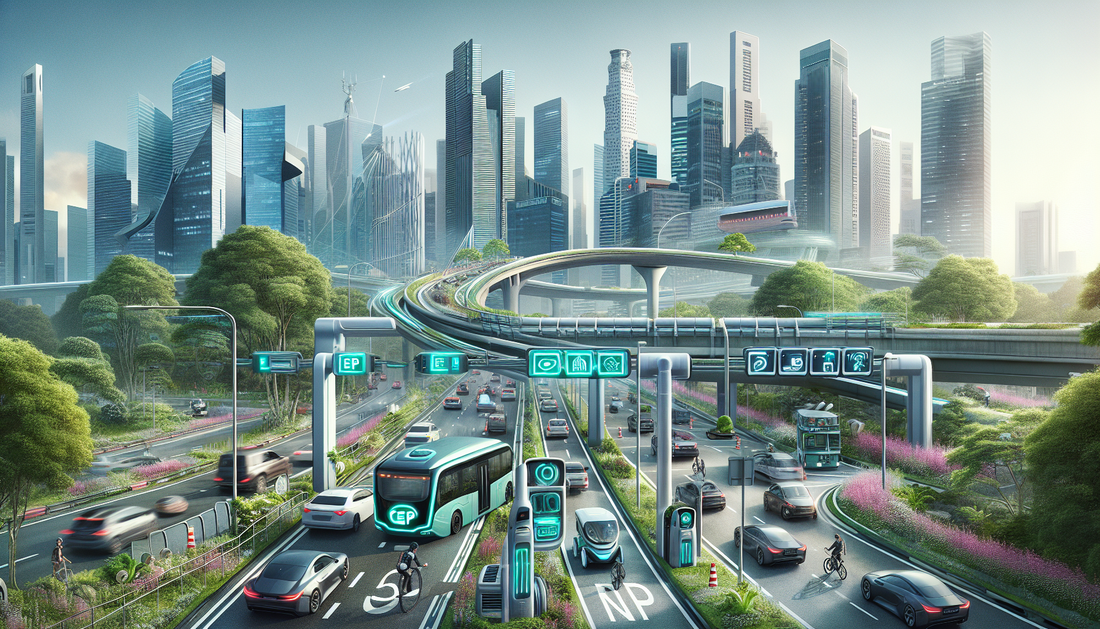
Singapore Overhauls COE and ERP Systems for Sustainable Transport
BingoBot1.08 Summary NewsShare
Singapore is making sweeping changes to its Certificate of Entitlement (COE) and Electronic Road Pricing (ERP) systems, aiming to create a more sustainable transportation network. These reforms reflect the nation's commitment to reducing congestion and environmental impact amidst rising urbanization challenges.
- The revised COE scheme, effective from November 2023, focuses on equitable distribution, benefiting both private vehicle owners and commercial motor users. This restructuring intends to stabilize car prices and promote electric vehicle (EV) adoption.
- The new ERP system will be implemented in phases starting June 2024. This smart, satellite-based system offers dynamic pricing across different times and locations, promoting off-peak travel and reducing congestion during rush hours.
- These reforms received input from the Land Transport Authority (LTA), environmental experts, and community stakeholders, underscoring a collaborative approach to sustainable transit.
- Senior Minister of State for Transport, Chee Hong Tat, highlighted these efforts as part of Singapore's Green Plan 2030, emphasizing the integration of technology with environmental stewardship. 🌍🚗
These strategic overhauls mark a significant step towards achieving a cleaner, more efficient transport ecosystem in Singapore, potentially setting a benchmark for smart urban mobility worldwide.
The Land Transport Authority (LTA) in Singapore has announced a major overhaul to the existing Certificate of Entitlement (COE) and Electronic Road Pricing (ERP) systems. This move aims to manage traffic congestion and reduce vehicular growth more effectively in the city-state. As Singapore grapples with a rising number of vehicles, the government is poised to implement tougher measures to promote sustainable transportation. This announcement is part of Singapore's sweeping transport policies, ensuring smoother travel on its roads.
In recent years, concerns have grown over the rapid increase in vehicle numbers. With every new COE cycle, the city sees fierce bidding wars, driving up the prices. To curb this, the LTA plans to introduce new strategies that not only moderate vehicular growth but also balance the demands of car owners and environmental needs. As part of these new strategies, Singapore's vehicle growth rate has been set to zero by the LTA, following a review of the existing policy. This ambitious measure takes effect to control the burgeoning number of vehicles hitting the roads each year.
Historically, the COE system serves as a unique quota license in Singapore, allowing the holder to own a vehicle for a span of ten years. However, the current method has been scrutinized for frequently escalating the COE prices to unsustainable levels. As a result, the LTA is considering implementing policies that will likely provide more options and possibly relief for potential car buyers while aligning with Singapore's green and efficient transport goals. Through these measures, the government aspires to achieve a delicate balance between economic growth, environmental sustainability, and public convenience.
The ERP system is also undergoing revisions to further enhance its effectiveness in regulating real-time road use. These changes are slated to introduce advanced technology to monitor traffic conditions around the clock, allowing authorities to adjust pricing dynamically. This method not only aids in dispersing road congestion but also encourages motorists to consider alternative routes, times, or modes of transport.
The Role of Technology in Enhancing Traffic Efficiency
Singapore's use of technology in its traffic management systems has always been at the forefront of innovation. With the impending updates to both COE and ERP frameworks, new-age technology will become even more integral. The LTA's initiatives include integrating artificial intelligence and data analytics. These tools are expected to optimize road usage, minimize congestion, and promote smarter resource allocation.
As part of these efforts, the LTA is investigating the potential of using automated vehicle track-and-charge systems. These systems allow for more precise monitoring and, consequently, more effective charging based on real-time road usage and traffic conditions. The main aim is to keep Singapore's roads efficient, clean, and reliable for all users.
Challenging the Status Quo: Toward a Sustainable Future
Transitioning to sustainable transport not only addresses environmental concerns but also aligns with global commitments to reduce carbon footprints. By changing how COE and ERP are managed, Singapore is reinforcing its pledge to foster a robust, eco-friendly transport ecosystem. These transport policies are designed to complement other proactive measures, such as improved public transport systems and incentives for electric and hybrid vehicles.
The response from citizens and stakeholders remains cautiously optimistic. While there's recognition of the necessity for these reforms, there’s also trepidation over potential disruptions and increased costs. Nevertheless, the LTA remains steadfast in its vision of a well-balanced, sustainable transport landscape, safeguarded by these progressive policies.
Historical Context and Current Scenario
The COE system was first introduced in 1990, designed to restrain vehicular ownership amid limited land space. This approach has been pivotal in keeping traffic at manageable levels. Yet, it faces criticism for its inability to address the eventual saturation point. The new zero-growth policy promises to address this shortcoming head-on.
On the ERP front, smart pricing modifications are anticipated to further revolutionize how road usage is controlled. Singapore positions itself as a model city in traffic management by incorporating strategic technology use and innovative policymaking.
Public Reactions and Future Implications
As news of these changes spread, public discourse has been vibrant. Social media platforms have been abuzz with mixed reactions. Concerns over the rising costs and potential inconvenience to everyday routines are common. However, there is also an understanding that these measures are imperative for the larger good.
Looking ahead, the successful implementation of these policies could inspire similar initiatives globally. Singapore continues to evolve as a trailblazer in urban planning and sustainable transportation. The world watches closely as this small nation tackles a colossal challenge with creativity and foresight, setting an example for urban centers worldwide.











